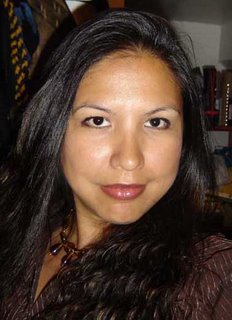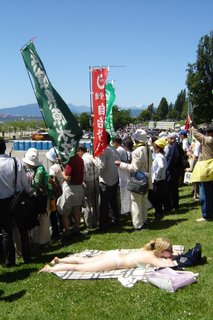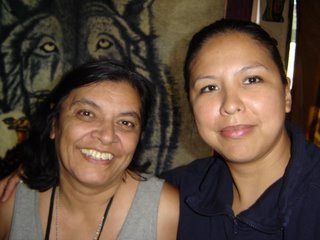Indigenous Women's Empowerment Day
 I invite you to attend this event, share some stories and be a part of the change in how society views Aboriginal women.
I invite you to attend this event, share some stories and be a part of the change in how society views Aboriginal women.Notes from Harsha Walia's email:
The Power of Women to Women Project will be hosting a press conference and community speak-out tomorrow, Tuesday March 20th, in response to the expected closure of DEWC's emergency shelter in the coming weeks.
Women of the Downtown Eastside community have been sleeping at the Downtown Eastside Women's Centre (DEWC) since November 19, 2006 because of a lack of safe and appropriate shelter and housing for women in the community. Community members, with the commitment of the Elders Council, demanded that DEWC to remain open past its regular business hours because the DEWC is the only community space for women and children that is open seven days a week, and does not have limitations on length of stay.
Averages of fifty women are using the centre each night to sleep.Women have made it clear that they believe the only real viable and dignified solution to end the cycles of violence, discrimination, substance use, poor health conditions, family separation, child apprehension, and social isolation is for government at all levels to commit to safe, secure, supported, and affordable housing for women.
Accordingly, the following demands have been put forward:
- Safe, supported, and long-term affordable housing for women be made available immediately- Welfare rates be increased 50% not just $50
- Community-based emergency safe spaces, such as the Downtown Eastside Women's Centre whose funding ends on MARCH 31, 2007, receive funding to operate on a 24-hour basis with adequate and private facilities for women- including storage, proper beds, and food.
We thank you for your support and feel free to get in touch with questions, feedback, suggestions etc.
Also, please find below further information on the crisis in women's housing.
Harsha WaliaEmail: project@dewc.ca
Tel: (604) 681-8480 x 234
Fax: (604) 681-8470
BACKGROUND INFORMATION ON WOMEN'S HOUSING
There are an increasing number of poor women, homeless women, women who are at risk of violence, and women affected by HIV/AIDS in Vancouver.
Cuts to income assistance, legal aid, women's centres, attacks on women's advocacy and support services, the lack of childcare support, rising costs of living and housing, and low-income labour all have had devastating impacts on women.
For example, with the June 2002 Employment and Assistance Act and Act for People with Disabilities, approximately 16,000 women have been removed from the social assistance in BC.
At the federal level in the past year, we have seen the lack of implementation of a universal childcare program that makes it nearly impossible for women, particularly single mothers, to seek employment.
One-third of BC welfare recipients are single-parent families, 88% headed by women.
Homelessness for many women is also an initial solution to unsafe housing and homes. These women leave their homes because of physical and/or sexual violence and exploitation. Safety and privacy are the primary concerns of homeless women.
According to the 2005 GVRD Homelessness Count, there has been an increase of 60% in the number of homeless women since the 2002 Count, with shelter beds available for no more than 50% of homeless women.
Overall, the number of homeless people has doubled to approximately 2,174 people in 2005.
It is estimated that the rate of rapid gentrification leading to the Olympics will triple the number of homeless in Vancouver. The number of people at-risk of homelessness in the region is extraordinarily high: 126,500 people at-risk of homelessness in 2001.
We believe that the cycles of violence, discrimination, substance use, poor health conditions, family separation, child apprehension, and social isolation of women are the direct result of various government policies that perpetuate conditions of poverty for women.
One such government policy- at all levels of government- is the lack of safe, secure, supported, and affordable housing for women. Despite the evidence from independent and government sources that indicate the crucial need for housing for women, governments have been slow to respond.
In fact, the opposite trend is being witnessed: Between 2003 and 2005 there was a net loss of 415 housing units for low-income singles, according to PIVOT research.
One in five open lodging house rooms in Vancouver have been sold or put up for sale since January 2006.
At the same time, many existing units are in danger of closing due to rising rental rates and deteriorating conditions.
With accelerating rates of gentrification leading to 2010, an estimated 1600 units of housing for low-income singles will be lost.
Join the women in the Downtown Eastside and Power of Women to Women Project at the Downtown Eastside Women's Centre to ensure safe, secure, supported, and affordable housing for women.









